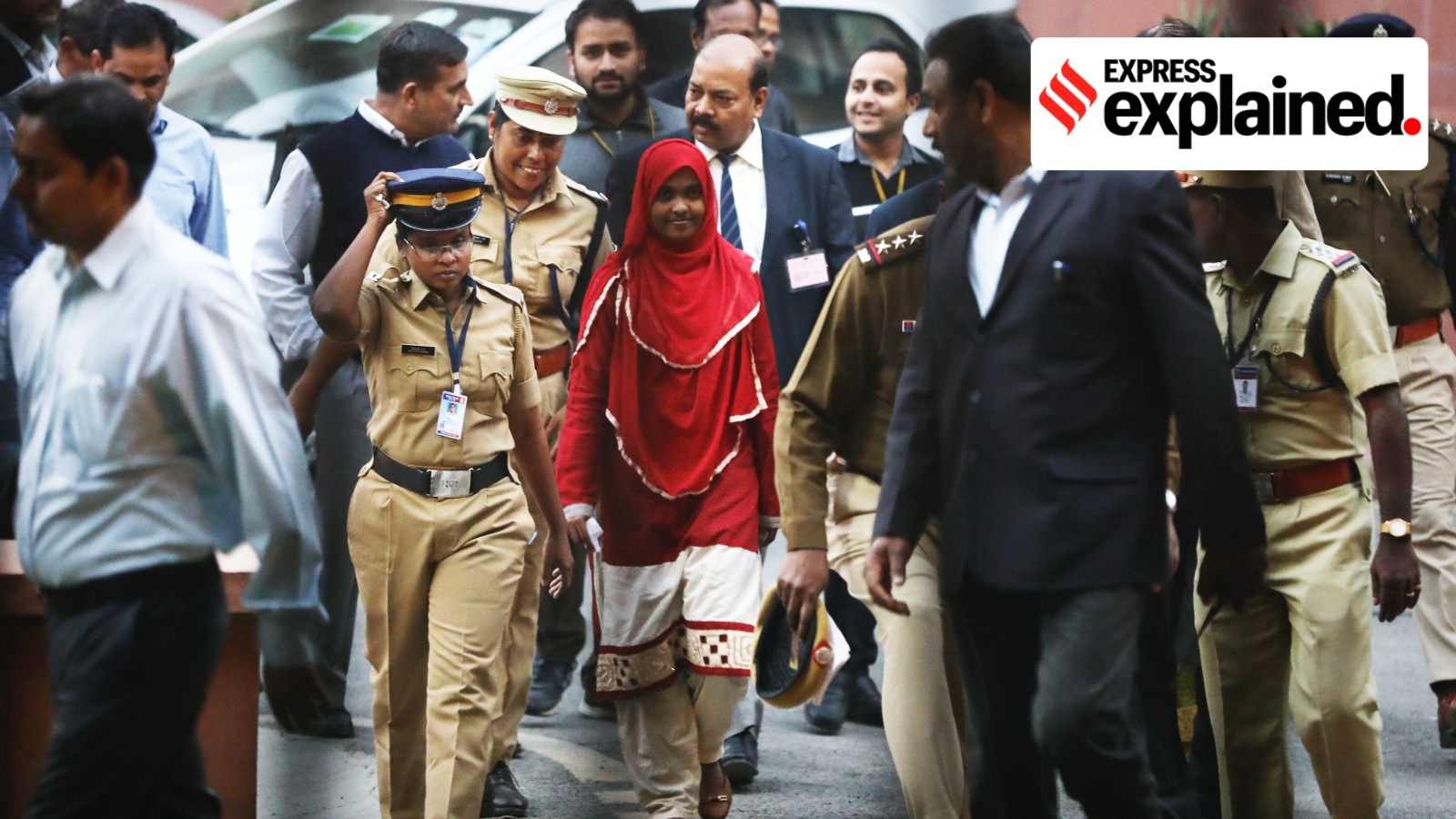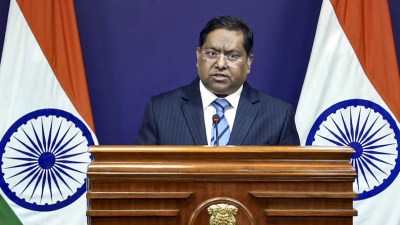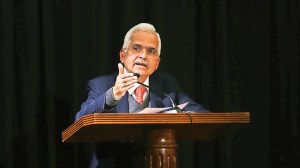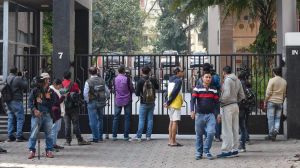Recalling the case of Kerala’s Hadiya, whose religious conversion led to SC judgement, NIA probe
In 2017, Hadiya’s father filed a habeas corpus petition in the Kerala HC, sometime after she expressed her wishes to convert to Islam and marry a Muslim man. Hadiya has now divorced her husband and re-married. What was the case?
 Hadiya on her way to the Supreme Court in 2017. (Express Photo by Abhinav Saha)
Hadiya on her way to the Supreme Court in 2017. (Express Photo by Abhinav Saha)Hadiya, a woman from Kerala whose religious conversion and marriage to a Muslim man in 2017 led to a high-profile legal case, has divorced her husband and re-married.
In a recent video, she said her parents were aware of the decision. The video came two days after her father KM Ashokan moved a habeas corpus petition in the Kerala High Court, alleging that he could not trace his daughter. Ashokan said they used to speak with Hadiya over the phone but did not know where she was. The High Court said it will consider the plea next week.
Back in 2017, Hadiya’s father had filed a habeas corpus petition in the HC, sometime after his daughter expressed her wishes to convert to Islam and marry a Muslim man.
Here is what the case was about, why it went to the Supreme Court, and why the central government’s counter-terrorism agency National Investigation Agency (NIA) stepped in.
What was the Hadiya case?
Born as KM Akhila in a Hindu family in Kerala’s Kottayam, Hadiya enrolled in the Sivaraj Homeopathy Medical College & Research Institute in Salem, Tamil Nadu, in 2010. Here, after becoming friends with some Muslim students, her interest in the religion grew. She began listening to religious sermons on her phone and participated in some rituals, such as fasting during Ramzan.
In 2015, she made her first attempt to convert to Islam by getting an affidavit attested by an advocate in Kochi, saying she was living as a Muslim under no compulsion from anyone. Hadiya attempted to persuade her parents to convert but after their refusal, she left home in 2016 and began living with a friend.
Habeas corpus for Hadiya
On January 12, 2016, Ashokan moved the first habeas corpus petition in the Kerala High Court. A habeas corpus petition is a recourse in law that protects against illegal detention by ordering the person to be to be produced in court. However, once in court, Hadiya refused to go with her parents.
She went to Sathya Sarani, an organisation for religious learning, and eventually began looking at Muslim matrimonial sites to find a husband.
According to a police officer, this worried Ashokan. Having heard of a few Muslims in Kerala leaving India with their wives to join the terrorist group Islamic State, he moved a fresh writ petition in HC, alleging there was a plan to take his daughter to Syria.
In response to the plea, Hadiya was produced before the court. Following her continued refusal to live with her parents, the court sent her to a hostel in Kochi. Hadiya filed an affidavit in court saying she had embraced Islam of her will, and was later allowed to live with a friend.
In December 2016, she got married to Shefin Jahan. Both were introduced to each other through a matrimonial website. Two days after their wedding, Hadiya returned to court with Jahan. But the court sent Hadiya to the hostel again and ordered Jahan not to have any contact with her.
On May 24, 2017, the Kerala High Court annulled the marriage. Ordering a probe, it said, “A girl aged 24 is weak and vulnerable, capable of being exploited in many ways.” It sent Hadiya back to her parents and put her under police surveillance.
When the NIA stepped in
The Supreme Court, acting upon a petition from Jahan, ordered an NIA probe into the case in August 2017. The three-judge bench, headed by then Chief Justice Dipak Misra and comprising Justices AM Khanwilkar and DY Chandrachud, said: “The NIA’s involvement is necessary to ascertain if this is really an isolated case or is there something more… something wider…”
The apex court allowed Hadiya to resume her House Surgeoncy at the Homeo Medical College and appointed Dr G Kannan, the college principal, as her guardian. Hadiya was allowed to meet her husband here under CCTV surveillance.
What the Supreme Court ruled
In April 2018, the SC set aside the Kerala HC’s annulment of Hadiya and Jahan’s marriage. It also ruled that the NIA can continue to probe the issue of a “larger conspiracy” behind the alleged forced religious conversion of Hadiya and others in Kerala.
“We clarify that the investigations by the NIA in respect of any matter of criminality may continue in accordance with law,” said the bench.
But Hadiya’s choice of a husband cannot be questioned, it added. “She may be brainwashed, but what can we do? Whether the man to whom she is married is good or not is for her to decide. Whether it’s an independent choice or not, only she knows. We can’t get into it. If she comes to court and says she married by her choice, that’s the end of it,” the bench said.
“The right to marry a person of one’s choice is integral to Article 21 (right to life and liberty) of the Constitution,” the court held.
Justice Chandrachud also wrote, “The choice of a partner whether within or outside marriage lies within the exclusive domain of each individual. Intimacies of marriage lie within a core zone of privacy, which is inviolable… Neither the state nor the law can dictate a choice of partners or limit the free ability of every person to decide on these matters. They form the essence of personal liberty under the Constitution.”
The court called Hadiya’s father an “obstinate one who has endeavoured immensely in not allowing his daughter to make her own choice in adhering to a faith and further making Everestine effort to garrotte her desire to live with the man with whom she has entered into wedlock”. The court termed this a “manifestation of the idea of patriarchal autocracy and possibly self-obsession with the feeling that a female is a chattel”.
The SC also questioned the HC’s decision to annul a marriage of consenting adults. “Can there be a roving inquiry into matrimonial relationship between two consenting adults to find if there was no consent,” Chief Justice Dipak Misra had asked.
Ashokan had said he was pained to let his daughter go with a “terrorist”, adding he would continue the legal battle. He claimed that the NIA was pursuing a probe because it was convinced that Jahan was a terrorist.
- 01
- 02
- 03
- 04
- 05






































